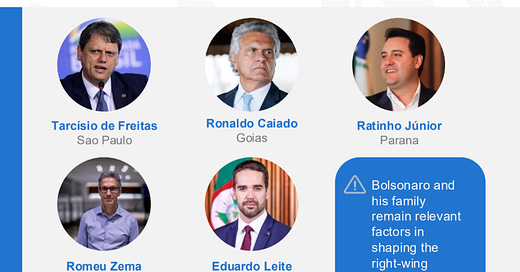Former President Jair Bolsonaro and seven former officials are on trial before Brazil’s Supreme Federal Court (STF) for their alleged roles in plotting a coup attempt that culminated in the January 8, 2023, attacks on the country’s democratic institutions.
Despite being ineligible to run for office until at least 2030 and facing possible prison time, Bolsonaro remains a relevant figure on Brazil’s political right ahead of the 2026 presidential election. His political capital and approval ratings have held steady at around 45%, and he continues to poll competitively against President Lula in hypothetical second-round scenarios.
The trial may even energize his base, strengthening the conservative movement. Bolsonaro may choose to stay symbolically in the race, even if convicted or imprisoned, and designate a family member as a proxy, a move that could further fragment the conservative vote as other candidates gain ground on the right.
What are the charges?
Leadership of a criminal organization
Attempted violent overthrow of democratic order
Attempted coup d’état
Violent damage to public property
Destruction of federally protected heritage sites
Where the Case Against Bolsonaro Stands — and What’s Next
In March, the Supreme Court ruled that the charges were strong enough to move forward, and Bolsonaro was officially made a defendant, initiating a long and complex process.
Since then, the case has been in the evidence-gathering and witness-testimony phase.
Last week, Justice Alexandre de Moraes, the case’s rapporteur, carried out what is considered the final step of this phase: hearing testimony from those involved, including the former president.
Marked by a relatively informal and cordial tone, Bolsonaro denied any involvement in the alleged plot.
]Subsequently, Justice Moraes will present his vote, followed by the remaining justices of the Supreme Court’s First Panel. While a final trial date has not yet been scheduled, it is expected to take place by the end of this year.
Can Bolsonaro ba arrested now?
Unlikely at this stage. Legal experts agree that although preventive detention is legally possible, it can only be ordered if there’s a clear risk of interference with the investigation, repeat offenses, or flight.
Bolsonaro remains free as the trial progresses, although his passport has been seized.
Could an Amnesty Law Change the Outcome?
Bolsonaro’s allies in Congress have been pushing for a blanket amnesty that would shield him and others involved in the January 8 attacks. However, legal experts consider such a move unconstitutional and politically unsustainable.
Main Political Dynamics – Looking Ahead to 2026
Despite his legal troubles and a fragmented right-wing landscape, Bolsonaro remains a key player in the Brazilian right-wing political spectrum. São Paulo Governor Tarcísio de Freitas is widely seen as his natural successor but is unlikely to run without his endorsement. Any candidate perceived as disloyal risks being branded a "traitor", a political death sentence in Bolsonaro’s orbit.
Former President Michel Temer is working to unify the center-right under the “Movimento Brasil” banner, rallying five key governors:
Political analysts widely expect that Bolsonaro will be convicted, which would bar him from running in the October 2026 presidential election.
• Although there is still time and various factors could influence next year’s race, we outline a few possible scenarios:
A fragmented first round doesn’t guarantee Lula’s reelection.
Brazil’s two-round system allows for late consolidation, and last-minute surges are common.
• If Brazil’s economic outlook worsens, any credible opposition figure—whether a governor or a Bolsonaro proxy—could defeat Lula in a runoff.
• International right-wing networks, including Trump-aligned actors, may rally around Bolsonaro if he is convicted, using his case to frame broader “lawfare” narratives. His imprisonment or political exclusion could also complicate Brazil-U.S. relations.




